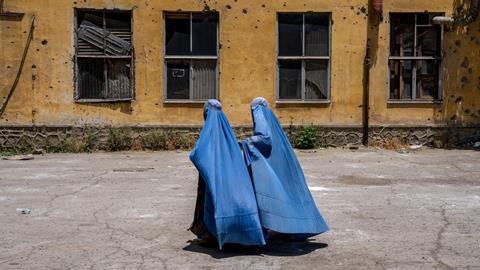What is happening in the courts of Afghanistan under the Taliban?
A small room with only a toilet in a yard in one of the poorest neighbourhoods in Kabul. This is the only temporary shelter that Asiyah and her daughter have available. Asiyah is a middle-aged single mother who lost her husband years ago. Her two young sons were killed. Her young daughter is the only person Asiyah has left in the world.
Asiyah recently lost the house her husband legally gave her because of a court decision by the Taliban-controlled court. When a man found her alone and helpless, he tried to seize her house. Asiyah resisted and complained to the former government court. During the process of the case, in 2021, the government of Afghanistan collapsed. As the judicial and legal system has changed, being a woman made the situation even more challenging for Asiyah. Her lawyer says that: 'Many times they even didn’t allow her to enter the court, because she is a woman alone. Or if they allowed her, they didn’t listen to her nor answer to any of her questions and telling her that if she wants to be heard, she must come to the court with her male chaperone.’
However where can she find a male chaperone? Her lawyer added: 'It’s just a trick. They inform women that they must be accompanied. If they ask someone to help them in the court, they ask [for] their ID cards and check what is the relationship between them. If it’s not a legal relationship between the man and woman, they will face forceful marriage or they will be sent to jail because of having [an] illegal relationship.’
With this background, it is obvious why Asiyah lost her house. 'I complained because of this injustice, to a Taliban judge,’ she said. 'He told me to marry my daughter to one of our fighters, then he will follow up (on) my case and take back my house. I gave up on my house because I don’t want to destroy my daughter’s life.'
In Afghanistan, in every case where one party is a woman and the other a man, the man is the one who will win. Seemingly the people involved in the justice and judicial system don’t listen to women or see them at all.
This article is based on interviews with four lawyers from different provinces. Their identities will be kept anonymous. They narrate a horrifying image of women in the courts in Afghanistan today. 'Once I went to the court trying to explain to the Taliban, about the worse economic situation that I am in, additionally the necessity of continuing to work as the only breadwinner of the family. Instead of allowing me to work, the Taliban asked me if I am single or married?
'After I responded that I’m single, they told me that I need to write a letter to their leader Mullah Hibatullah and ask him to marry me to one of his soldiers. Then with the Taliban soldier I’ll have an income and I won’t need to work.’
Under the previous government, in civil cases the losing party had to pay a certain amount of money to the government as a fine. The aim was to prevent misuse of the legal system. The new regime dissolved this fine, resulting in countless and pointless cases in the court which people are claiming on other people’s properties.
'This is a very good time for criminals to continue their illegal activities once again,' another lawyer says.
Under the previous government of Afghanistan, the laws of Afghanistan were established by following the Islamic legal system along with the codification of laws under the Roman-civil system. When the Taliban took power again, they set aside the 2004 Constitution of Afghanistan. On one occasion, in September 2021, the Taliban indicated that they might temporarily implement King Zahir Shah’s 1964 Constitution. However, other than that one mention, the Taliban has not discussed any constitution or constitutional order.
The Taliban’s court system has one judge, one mufti (Islamic jurist) and one clerk for every department. They are former fighters appointed by the Taliban. The judicial system says that they judge cases according to Majallah Al-Ahkam, the book for judges compiled in light of the Qur’an and the Hanafi school of thought.
However many sources from many different courts from different provinces confirm that the Taliban judges judge cases according to their wishes. Especially in cases involving women, they don’t listen to them or see them. If it is a case of domestic violence, they force women to apologise to their oppressor husband and to return to their lives of abuse.
'If you want to win any case, you just need to be a man who speaks Pashto and knows a Mullah in the court,' a lawyer says. 'No matter if you are claimant or defendant whether you are right or wrong.'
Half of the population of Afghanistan is women and girls. Ongoing gender apartheid is affecting every aspect of their lives. No media or journalists can cover what is happening to 20 million Afghan women and girls or how they suffer when their fundamental rights are taken away from them. They are suffering every day without any support.
'Mina Yousufzai' is an Afghan women’s rights activist and legal scholar
































4 Readers' comments